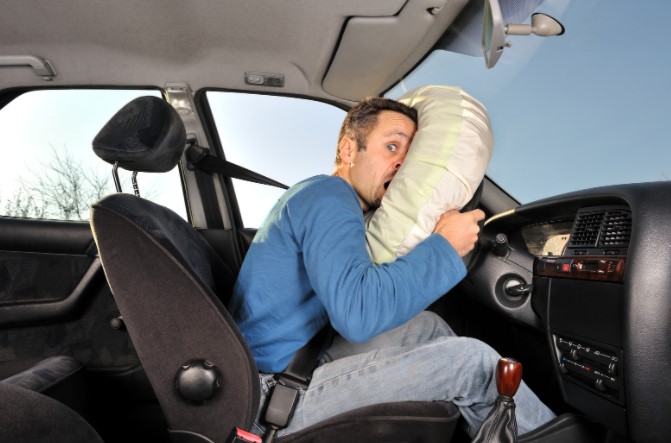Car Accident Safety
Car accidents are a major cause of injury and death. Knowing what to do in the event of an accident can help you stay safe. Here are some tips on how to prepare for and respond to a car accident.
Before an Accident
There are a few things you can do to prepare for the possibility of a car accident. These include:
- Wearing your seatbelt at all times. This is the most important thing you can do to protect yourself in the event of a crash.
- Being aware of your surroundings and other drivers. This means paying attention to the road and other vehicles, and being prepared to react to sudden changes in traffic patterns.
- Avoiding distractions while driving. This includes talking on the phone, texting, or eating. Any activity that takes your attention away from the road can increase your risk of an accident.
- Driving defensively. This means being aware of other drivers and anticipating their actions. It also means being prepared to take evasive action if necessary.
- Being prepared for a car accident. This includes knowing what to do if you are involved in a crash, such as calling 911, exchanging information with the other driver, and taking pictures of the scene.
During an Accident
If you are involved in a car accident, the most important thing to do is to stay calm and assess the situation. Here are some steps to follow:
- Pull over to the side of the road. If possible, pull over to a safe location where you will not block traffic.
- Turn on your hazard lights. This will alert other drivers to your presence and help prevent further accidents.
- Check for injuries. First, check yourself for injuries. Then, check your passengers and the other driver.
- Call 911. If there are any injuries, call 911 immediately.
- Exchange information with the other driver. This includes your name, address, phone number, insurance information, and license plate number.
- Take pictures of the scene. This will help you document the accident for insurance purposes.
- Report the accident to your insurance company. You should report the accident to your insurance company as soon as possible.
After an Accident
After a car accident, it is important to take care of yourself both physically and emotionally. Here are some tips:
- See a doctor. Even if you do not feel injured, it is important to see a doctor to get checked out. Some injuries may not be immediately apparent.
- Get plenty of rest. After a car accident, it is important to get plenty of rest. This will help your body heal and recover.
- Talk to someone. If you are feeling overwhelmed or stressed after a car accident, talk to someone you trust. This could be a friend, family member, therapist, or clergy member.
- Take care of yourself. Eat healthy foods, get regular exercise, and get enough sleep. Taking care of yourself will help you heal both physically and emotionally.
Car Accident Safety: Preparing for the Unforeseen
Preparing for an Accident
Car accidents are a frightening reality that can strike at any moment. While we can’t predict the future, we can take steps to prepare for the unexpected. One such measure is keeping a first-aid kit in your vehicle, equipped with essential supplies to tend to minor injuries. Additionally, ensure you have easily accessible emergency contact information to facilitate prompt assistance if necessary.
Driving with Defensive Strategies
Anticipating other drivers’ actions is crucial for accident prevention. Drive defensively, assuming that not everyone around you is as attentive as you are. Maintain a safe following distance, allowing ample time to react to unexpected situations. Be wary of potential hazards, such as pedestrians, cyclists, and wildlife, and adjust your driving accordingly.
Maintaining Vehicle Safety
Regular vehicle maintenance is paramount for ensuring your car is in optimal condition. Adhere to the manufacturer’s recommended maintenance schedule for inspections, oil changes, and tire rotations. These measures can help prevent breakdowns and ensure your vehicle is safe to operate. Furthermore, consider investing in safety features such as anti-lock brakes, stability control, and airbags, which can significantly enhance your protection in the event of an accident.
Avoiding Distractions
Distracted driving is a leading cause of accidents. Put your phone away while behind the wheel, as even a momentary lapse in attention can have dire consequences. Texting, browsing the web, and engaging in other distracting activities can wait until you’re safely parked. Remember, the road demands your full attention. It’s not worth putting yourself or others in harm’s way for the sake of a quick message or social media update.
Staying Alert and Rested
Driving while tired or under the influence of alcohol or drugs is a recipe for disaster. When you’re behind the wheel, you need to be alert and have your wits about you. Get plenty of rest before embarking on long drives and avoid driving if you’re feeling drowsy or impaired. Remember, the consequences of driving under the influence extend far beyond yourself, potentially affecting innocent lives.
Car Accident Safety: Stay Calm, Stay Safe
Driving is a common part of our lives, but it’s important to remember that accidents can happen at any time. While we can’t always prevent them, we can take steps to prepare ourselves and minimize the risk of injury.
During an Accident
If you’re involved in a car accident, it’s crucial to remain calm. Panic can cloud your judgment and make it harder to react effectively. Take a few deep breaths and assess the situation. Check for any injuries, both to yourself and your passengers. If anyone is hurt, call for help immediately.
If you’re able to move, get out of the vehicle and away from traffic. If there’s a safe place to pull over, do so. Turn on your hazard lights to alert other drivers of the situation.
Once you’re out of harm’s way, gather any necessary information. Exchange contact information with the other drivers involved, and take photos of the damage. If there are any witnesses, get their names and contact information as well. This will help you later when filing a claim or reporting the accident to the authorities.
It’s important to stay calm and collected after an accident, even if you’re feeling shaken up. By taking these steps, you can help ensure the safety of yourself and others.
Car Accident Safety: A Comprehensive Guide to Protecting Yourself
Car accidents are an unfortunate reality of life, and they can happen to anyone, anytime. While we can’t always prevent them, there are steps we can take to protect ourselves and our loved ones. Here’s a comprehensive guide to car accident safety, covering everything from how to stay safe on the road to what to do in the aftermath of a crash.
Staying Safe on the Road
The best way to avoid a car accident is to drive defensively. This means being aware of your surroundings, obeying the speed limit, and avoiding distractions like texting or talking on the phone. It’s also important to wear your seatbelt every time you get in a car, and to make sure that your passengers are buckled up too. By following these simple steps, you can significantly reduce your risk of being involved in a car accident.
What to Do After an Accident
If you’re involved in a car accident, it’s important to stay calm and collected. The first thing you should do is check yourself and your passengers for injuries. If you’re injured, seek medical attention immediately. Once you’ve made sure everyone is okay, you can start to gather information from the other driver involved in the accident. This includes their name, contact information, insurance information, and license plate number. You should also take photos of the accident scene, including the damage to both vehicles. If there are any witnesses to the accident, get their contact information as well.
Reporting the Accident
Once you’ve gathered all the information you can, you should report the accident to the police. This is important even if there are no injuries, as it will create a record of the incident. The police will take your statement and investigate the accident, which can help to determine who was at fault. You should also report the accident to your insurance company as soon as possible.
Seeking Medical Attention
Even if you don’t feel injured immediately after a car accident, it’s important to seek medical attention as soon as possible. Some injuries, such as whiplash, may not show up right away. By getting checked out by a doctor, you can rule out any serious injuries and get the treatment you need to recover from your injuries.
Car Accident Safety
Car accidents are a prevalent and preventable cause of pain, suffering, and death. According to the National Highway Traffic Safety Administration (NHTSA), over 6 million car accidents occurred in the United States alone in 2020. These accidents resulted in over 42,000 fatalities and an estimated 4.8 million injuries.
While not all car accidents are preventable, many of them can be avoided by taking simple precautions. Here are some tips on how to stay safe on the road:
Preventing Accidents
Obey traffic laws. Even when we’re running late, ignoring traffic signs and signals is never worth putting lives at risk. Always come to a complete stop at stop signs, and when you see a yellow light, slow down – don’t speed up!
Driving under the influence of alcohol or drugs is one of the most dangerous things you can do. Alcohol and drugs impair your judgment and reaction time, making you more likely to cause an accident. If you will be drinking or using drugs, plan ahead and arrange for a sober ride home.
Be more aware of your surroundings. These days, we’re all wired up to technology. But texting, talking on the phone, or scrolling through social media while driving can be deadly. These distractions take your eyes off the road, your hands off the wheel, and your mind off the task of driving.
Defensive Driving Techniques
Defensive driving is about anticipating and avoiding hazards. By thinking ahead and adapting your driving to the conditions, you can reduce your risk of being involved in an accident. Here are ten tips for practicing defensive driving:
- Maintain a safe following distance. The three-second rule is a good starting point, but you may need to increase your following distance when driving in bad weather or on slippery roads.
- Always signal your intentions. Let other drivers know what you’re planning to do by using your turn signals, brake lights, and headlights.
- Obey the speed limit and drive according to the conditions. Adjust your speed for weather, traffic, and road conditions.
- Avoid tailgating. Give the car ahead of you plenty of space so you have time to react if they brake suddenly.
- Be aware of your blind spots. Check your mirrors frequently and shoulder check before changing lanes or merging into traffic.
- Drive defensively around large trucks. Trucks have large blind spots, so avoid driving in their blind spots and give them plenty of room when passing.
- Be prepared for emergencies. Keep your car in good working condition and have an emergency kit in your car. In the event of an accident, pull over to the side of the road and call for help.
What to Do If You’re in an Accident
If you’re involved in a car accident, the most important thing to do is stay calm and assess the situation. If you or anyone else is injured, call 911 immediately. Move your vehicle to the side of the road if possible, and turn on your hazard lights. Exchange information with the other drivers involved in the accident, including your name, address, phone number, and insurance information. You should also take pictures of the accident scene and any damage to your vehicles.
Once you’ve taken care of the immediate aftermath of the accident, you should contact your insurance company and report the accident. Your insurance company will help you file a claim and get your car repaired or replaced. You may also want to contact a lawyer to discuss your legal options.
Car Safety Features
Car safety features have come a long way in recent years. Many new cars are now equipped with features such as airbags, anti-lock brakes, and electronic stability control. These features can help prevent accidents and reduce the severity of injuries in the event of an accident.
When shopping for a new car, be sure to consider the safety features that are available. You may also want to research the safety ratings of different vehicles before making a decision. The National Highway Traffic Safety Administration (NHTSA) and the Insurance Institute for Highway Safety (IIHS) both provide safety ratings for new vehicles.
Conclusion
Car accidents are a serious problem, but they can be prevented. By following the tips in this article, you can help keep yourself and others safe on the road.





Leave a Reply